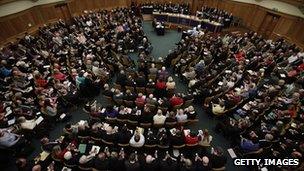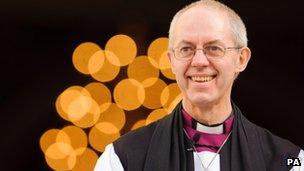Women bishops on agenda as General Synod meets in York
- Published

The vote on women bishops failed to pass the House of Laity in November last year
The Church of England's ruling General Synod meets later under intensifying pressure to solve the impasse over the introduction of women bishops.
The new Archbishop of Canterbury, Justin Welby, has said he wants to see the measure passed as soon as possible.
But traditionalist Anglicans say new proposals offer fewer concessions than legislation they rejected in November.
The York meeting is also set to endorse an apology over the failure to prevent sexual abuse in the Chichester Diocese.
Women now make up about a third of the Church's priests and the measure before the Synod last year would have made it lawful for them to be consecrated to the office of bishop.
It passed in the Houses of Bishops and Clergy, but failed to gain the required two-thirds majority in the House of Laity.
The controversy has centred on the provisions for parishes opposed to women bishops to request supervision by a stand-in male bishop.
Lay members of the Synod narrowly blocked the vote because they were dissatisfied with the exemptions offered to the traditionalists.
The new proposals before the Synod meeting would require only a simple majority for the measure to be adopted as draft legislation ahead of a possible vote in 2015.

The Archbishop of Canterbury will make his first presidential address to the Synod
BBC News religious affairs correspondent Robert Pigott says further angry division seems inevitable when the Synod debates the plan.
Woman priests believe their status as bishops should not be undermined by concessions to Anglicans who do not want to serve under them, our correspondent adds.
The Synod meeting will begin with the first presidential address by Mr Welby, who became Archbishop of Canterbury in March.
The Synod says it will be an opportunity for him to outline the main challenges facing the Church of England.
The five-day meeting at the University of York is also expected to back an apology to victims of abuse by priests in the Chichester Diocese in the 1960s, 1970s and 1980s.
An inquiry last August found what the Church has acknowledged was "individual wickedness on the part of abusers" and serious failures to protect children, or listen properly to the victims.
This motion before the Synod will ask members to endorse an apology by the archbishops of Canterbury and York, and agree plans to take further legislative and non-legislative steps to improve policies and practices on safeguarding children.
The Synod is also likely to criticise government welfare plans which the Church claims will harm families already struggling to make ends meet, and disproportionately affect the poorest children.
There will also be a vote on whether three Yorkshire dioceses will merge.